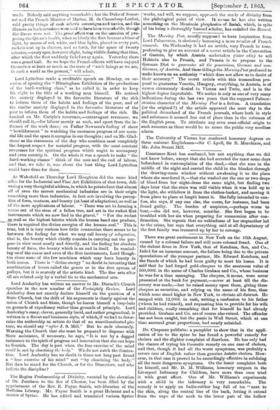Lord Amberley has written an answer to Mr. Disraeli's Church
speeches in the new number of the Fortnightly Review. Lord Amberley does not exactly declare himself on the question of a State Church, but the drift of his arguments is clearly against the union of Church and State, though he leaves himself a loop-hole on grounds of expediency rather than grounds of principle. Lord Amberley's essay, clever, generally lucid, and rather pragmatical, is written in a fluent and luminous style, of which, if we had to deter- mine the authorship as artists do that of an unauthenticated pic- ture, we should say "after J. S. Mill." But he ends obscurely. Warning the Church that she must be prepared to dispense with State assistance, if necessary, he says, "it is not by a dogged resistance to the spirit of progress and innovation that she can hope to flourish. The day is past when the free exercise of the mind could be met by chastising the body." We do not catch the illustra- tion. Lord Amberley has no doubt in times not long past found a "free exercise of his mind" met "by chastising the body." But does he stand for the Church, or for the Dissenters, and who inflicts the discipline?






























 Previous page
Previous page